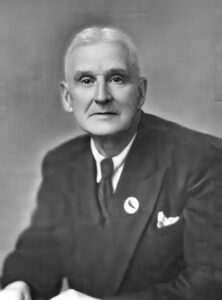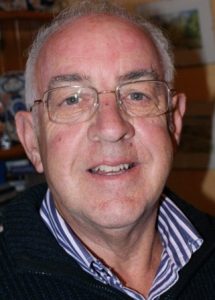
David Oates, himself a superb deliverer of Cornish dialect stories, brings us an article about Herbert Lean who he describes as the master storyteller. To back up this claim he includes an audio recording of Herbert telling the tale of the Penponds Outing.
Penponds Outing – Herbert Lean
The dialect stories of Herbert Lean are, by common consent, the finest of their type. Many have tried over the years to emulate him but in spite of some very fine efforts, none come close to this master of his craft. The stories reflect a period in our past, and a way of life, that has long passed away. It was a time when many of the inhabitants of an area were related to one another, when doors were never locked and, more importantly, the community took care of its vulnerable members without expecting the state to do so. It is important not to see this as some sort of “golden age” where the sun always shone as there were people without the support we take for granted who did not survive. However, there was a sense of community and togetherness that we lack in many ways today. In our times there has been a massive cultural shift – not always for the better.
Herbert Lean wrote about that society – sometimes in a way that would not be deemed politically correct today but always in a gentle, kindly way – the characters he poked fun at were, nevertheless, embraced by the arms of the society they lived in.
So, what of Herbert Lean? He died in 1968 and many of his contemporaries are long since gone as well. So, we have to rely on half remembered anecdotes and fragments. My hazy memory of him is of when he would read his stories through a public address system to crowds assembled in Commercial Square, Camborne during Holman’s Week. That week needs documenting before too many who remember it are gone as well – part of that golden age for Camborne when the benevolent principal employer, Holman Brothers, felt a social responsibility towards the town.
Herbert would sit in the large bay window of the long demolished Commercial Hotel where the Nat-West bank now stands and enthral the assembled crowds. He was a true man of Camborne, a bard of the Cornish Gorsedh, Den Len Cambron – Faithful man of Camborne. He lived in Atlantic Terrace, Camborne, up the hill from the Railway Station and was by most accounts a bachelor. He lived there in conditions that were primitive at the time of his death as he didn’t use electricity and lit the entire house by oil lamps which caused a layer of soot to be deposited on the ceilings. There is a fascinating story, however, which suggests he was once married but that his wife had “disappeared” one day never to be seen again. Most accounts of his life suggest he was somewhat of an eccentric and a possible sadness in his life may account for that. He was the Sunday School Superintendent at the parish church and spent a lot of his time entertaining locally, in the sense of reading his stories in churches and chapels and doing little acts and sketches with the help of others. The tale is told of one act he did at Beacon Chapel which involved him miming the dropping of coins into a container. Unknown to the audience, he had an accomplice behind the curtain who would make a sound effect to coincide with the miming. On this occasion the spell was broken when the accomplice put his head around the curtain and shouted “’ow many times do ‘ee wunt ’un this time, Herbert?”. It seems he was also a keen amateur magician – as evidenced by the equipment to perform tricks found in his house after his death so this particular anecdote may have been drawn from one of his magic shows.
He was always anxious to get copies of his books as soon as they were printed and John Philips of Camborne tells of how he was working in the printers at this time and Herbert would come in and wait for a copy to be specially guillotined for him while he waited. He would then reward John by fumbling in his pocket for a mint to give him and when it appeared it would be covered with all sorts of unmentionable debris from the bottom of his pocket. John always felt this was not a gift for him per se but part of Herbie’s efforts to create a humorous situation.
So was he the bachelor, all who remember him seem to think he was? Well, there is a marriage record. He married Florence Charlotte Phillips in 1911 at St Andrew’s Church, Redruth, though there are no other references to her. Her father was born at Gwithian but her mother was a Channel Islander. We don’t know if she died, they were divorced or something else – divorce is less likely at that time because of both the legal difficulties in obtaining it and the social stigma attached. The evidence is probably there for anyone wishing to delve further.
And what about Herbert himself – “Faithful Man of Camborne”? Well, his family seem to have originated in Gwennap Parish and Herbert himself was born …wait for it, Camborne folk …… at Mount Ambrose, REDRUTH!
Dead now for many years, Herbert’s legacy is still enjoyed by many in the form of his dialect stories, made all the more enjoyable by the existence of the only known recordings of Herbert telling a few of his own stories – stories he embellishes somewhat in the recordings when placed against the written word.
 David Oates is a Cornish bard who has published a history of Troon, entitled “Echoes of an Age”, a guide to Godrevy and Gwithian, “Walk the hidden ways” and a slim volume of his own verse, “Poems from the far west”. His unpublished work includes a reflection on a Cornish childhood, “What time do they close the gates, Mister?” and a fictionalised story for young people based on the extant life of St Gwinear, with the working title, “The son of a king”. David is working on another guide in the “Walk the hidden ways” series, entitled “Hard Rock country”.
David Oates is a Cornish bard who has published a history of Troon, entitled “Echoes of an Age”, a guide to Godrevy and Gwithian, “Walk the hidden ways” and a slim volume of his own verse, “Poems from the far west”. His unpublished work includes a reflection on a Cornish childhood, “What time do they close the gates, Mister?” and a fictionalised story for young people based on the extant life of St Gwinear, with the working title, “The son of a king”. David is working on another guide in the “Walk the hidden ways” series, entitled “Hard Rock country”.
David is a tenor singer with the well-known group, Proper Job, based in mid- Cornwall and has collaborated with Portreath musician, Alice Allsworth, to write the lyrics for a number of songs about Cornwall and the Cornish.
